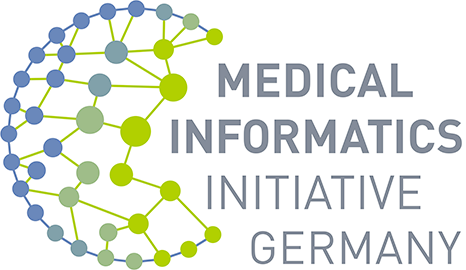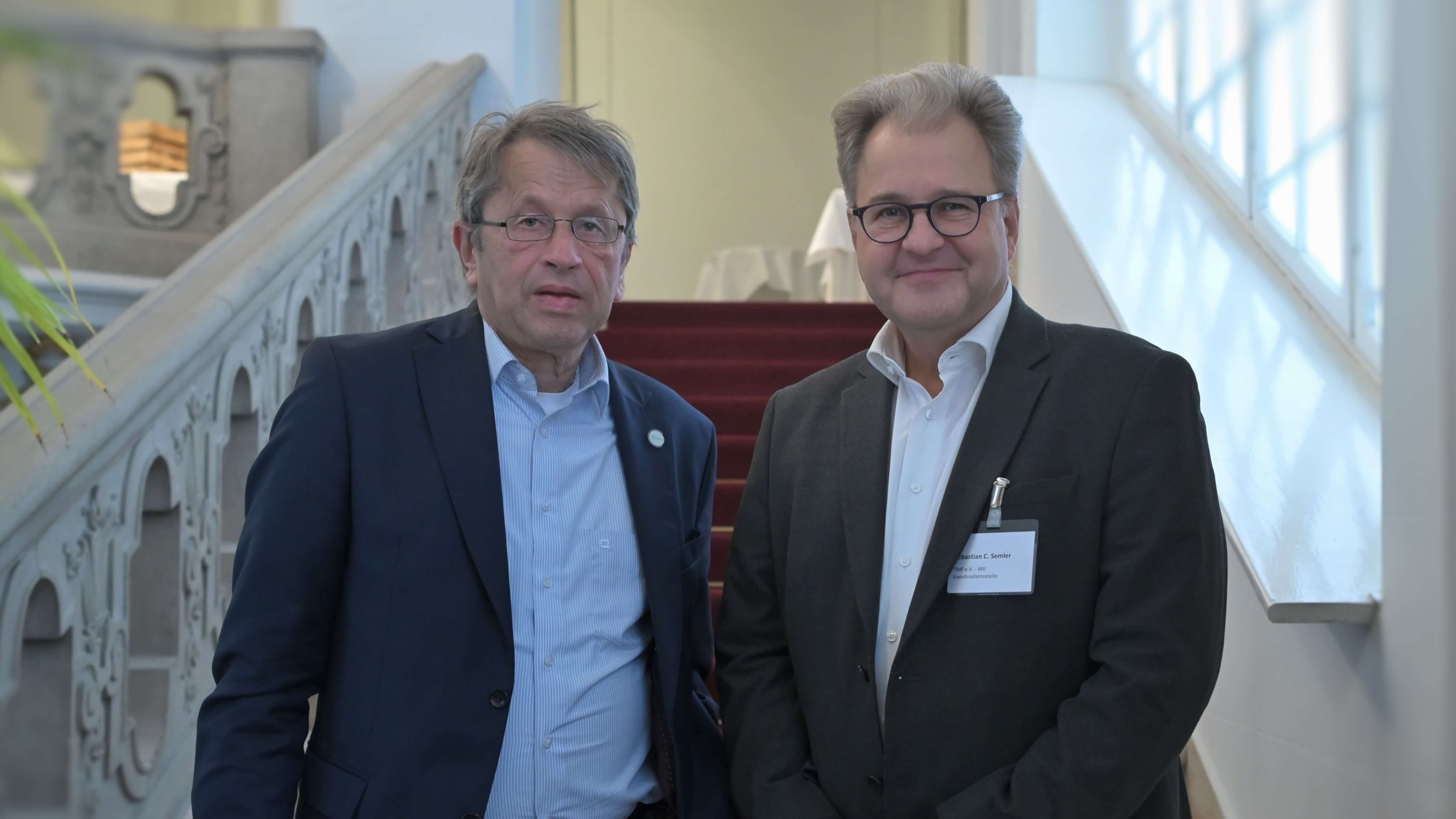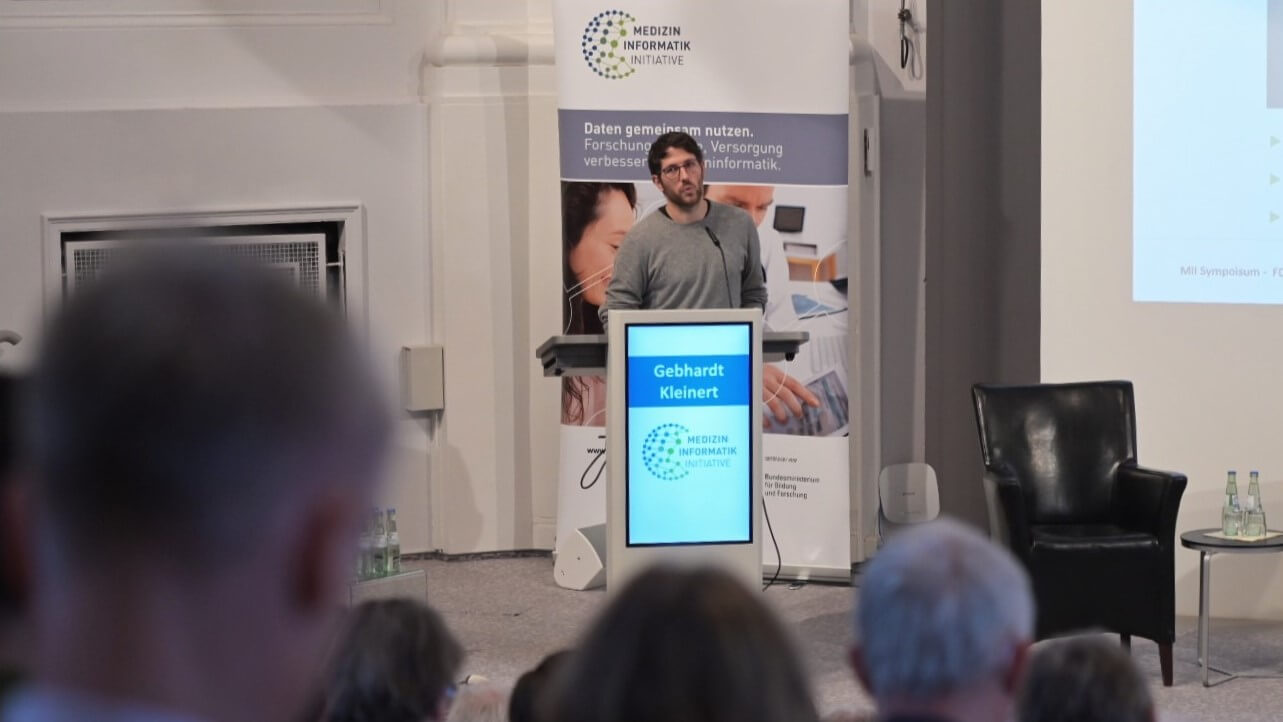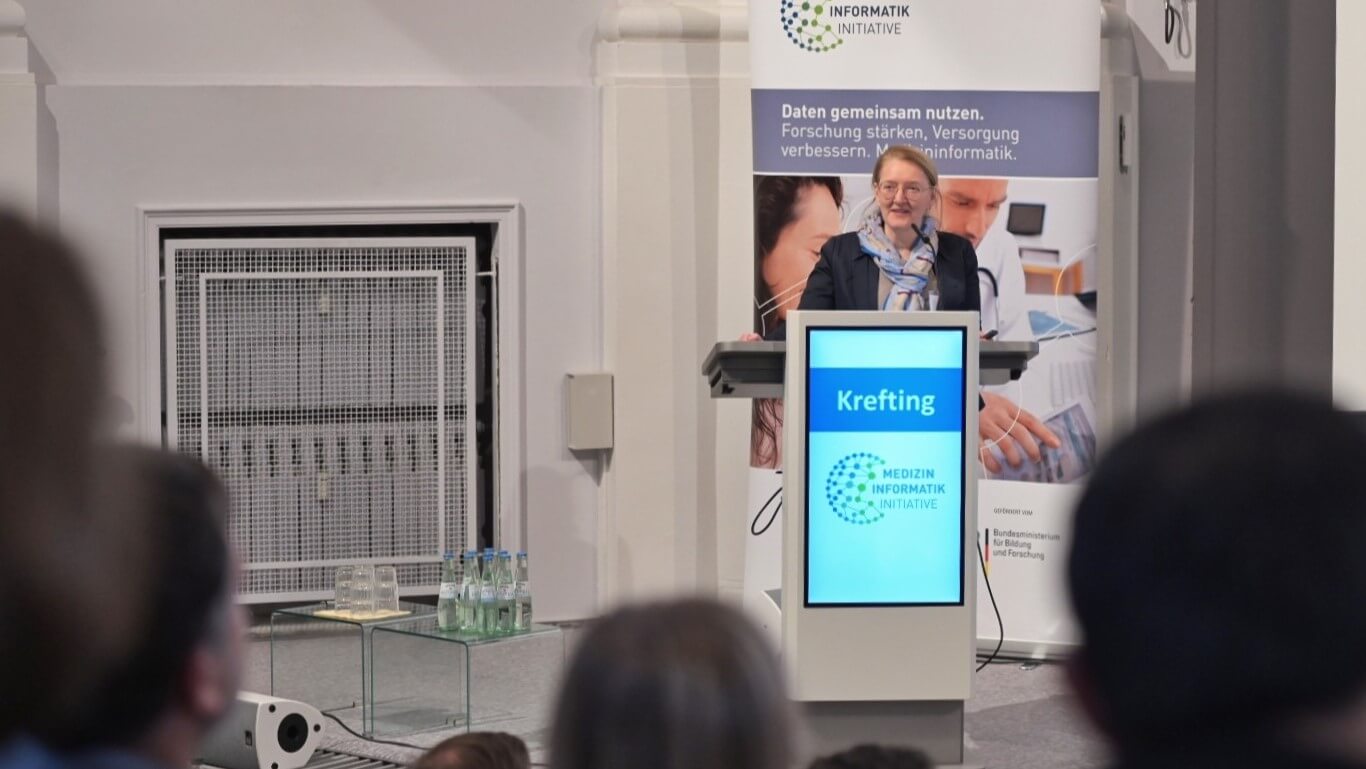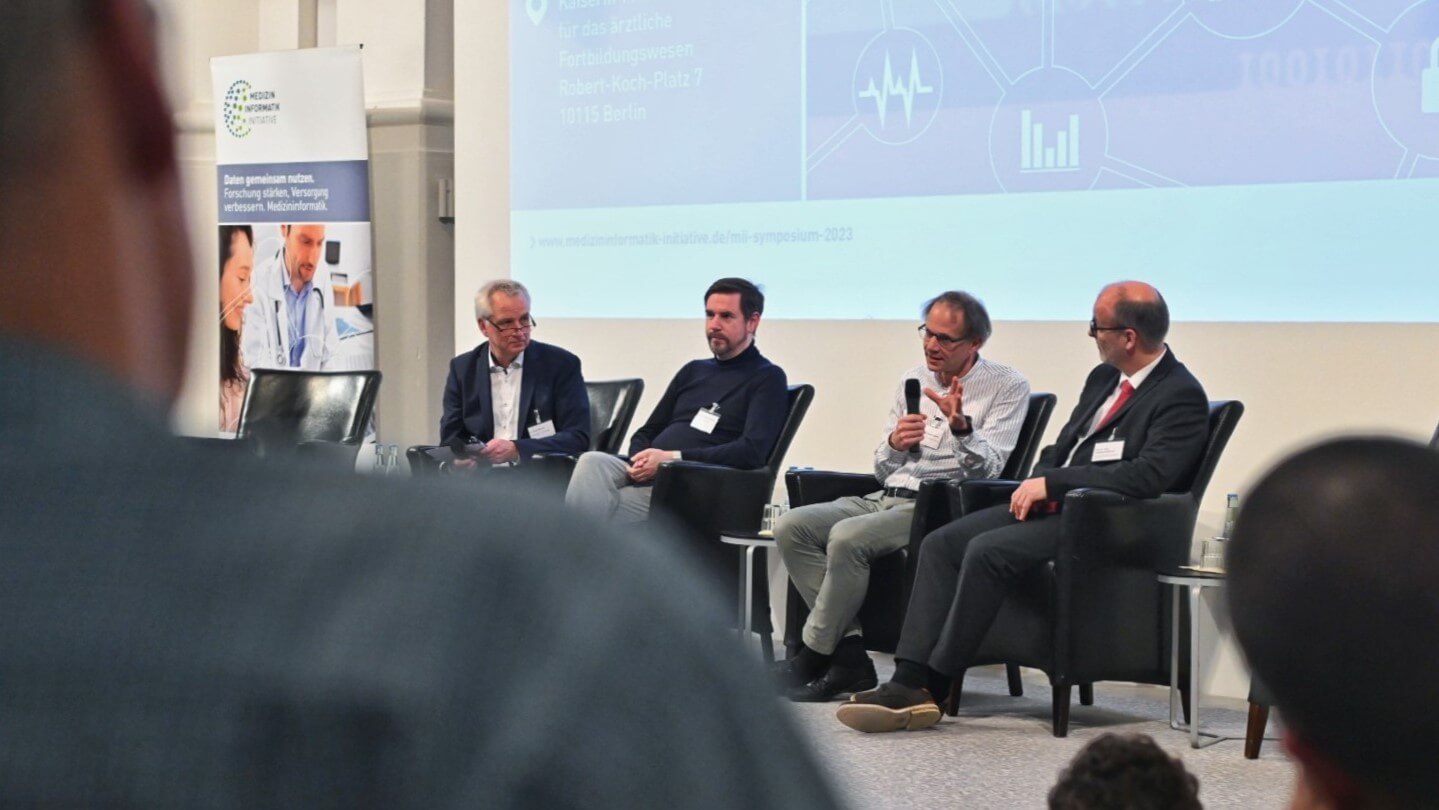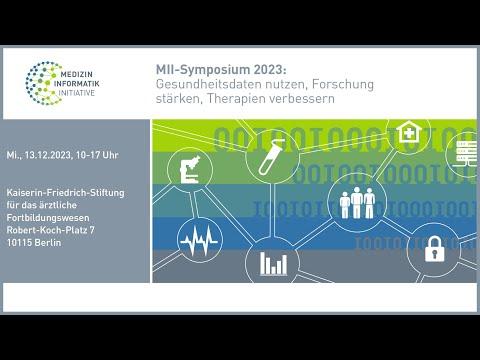Berlin, 14/12/2023. Under the motto "Using health data, strengthening research, improving therapies", around 300 participants attended the Medical Informatics Initiative (MII) symposium in Berlin on 13 December 2023. This year, the MII, which is funded by the Federal Ministry of Education and Research (BMBF), entered its consolidation and extension phase. Experts from the fields of medical informatics, patient care and research of German university medicine and other MII partners presented the current results of the initiative, the research data infrastructures and new use cases.
In the BMBF's opening address, it was made clear that the MII had successfully demonstrated how data analyses can help to improve therapies and prevent diseases. The added value of data utilisation for medical research is particularly evident in cross-location collaboration. Researchers from all university hospitals and beyond benefit from the MII structures and processes. For example, the MII's Portal for Medical Research Data (FDPG) could serve as a "blueprint" for the work of the Data Access and Coordination Centre for Health Data as envisaged in the Health Data Utilisation Act (GDNG).
Data integration centres (DIC) have been set up at university hospitals throughout Germany as part of the MII. A data integration centre collects research and healthcare data from the hospital, processes it in accordance with data protection regulations and makes it available to the scientific community across all sites. The MII core data set describes the minimum patient data that the DIC should hold. The DIC were integrated into the Network of University Medicine (NUM) at the beginning of 2023 and are to be sustainably financed. They will continue to be developed in a harmonised way via the MII. The cooperation between the MII and NUM that was initiated this year is to be further advanced.
In his keynote speech, Prof Dr Heyo K. Kroemer, Chairman of the Board of Charité - Universitätsmedizin Berlin, member of the National Steering Committee of the MII and member of the National Task Force of the NUM, said: "The MII has decisively advanced the nationwide networking and cooperation of university medicine in the field of routine clinical data in recent years. Thanks to the infrastructure created by the MII, data from patient care at university hospitals can be shared across sites and used for medical research while complying with data protection and data security. This makes the initiative a pioneer in the digitalisation of healthcare research and will further improve patient care. The integration into the NUM, which opens up further clinical research data in addition to routine clinical data, offers the MII's data infrastructure a long-term perspective."
First data usage projects carried out via the FDPG
The FDPG, which enables the use of healthcare data for research, is essential to the MII infrastructure. Since May 2023, it has offered researchers the opportunity to query and apply for the available data from the healthcare documentation of all German university hospitals via a central access point. Data from more than ten million patients can already be queried in the FDPG. 25 MII sites and their DIC are connected to the FDPG portal for feasibility queries. The portal is already being used by almost 400 researchers, and the number of users is steadily increasing. In preparation for a possible European Health Data Space, Germany would therefore already be equipped with functioning structures for data access points.
Prof Dr Andreas Chiocchetti from Frankfurt University Hospital demonstrated how the data application works based on the example of the NUM project coverCHILD, which is funded by the BMBF. The aim of coverCHILD is to develop a research platform for data analysis that is dedicated to the effects of infectious diseases and their consequences on the mental and somatic health of children and adolescents using the example of COVID-19.
"Without the MII and the FDPG, the core datasets would be very difficult to access across the multiple sites. We at coverCHILD can now draw on established standards and processes to understand the diagnostic patterns of children and adolescents during the pandemic and across the board in the future," said Prof Chiocchetti.
Based on data usage projects within the framework of the MII and the NUM, the application and realisation of projects via the FDPG are currently being evaluated in order to further improve the processes.
Networking with further data sources
One focus of the current MII funding phase is to involve new partners from the outpatient sector and access new data sources. The aim of the "Digital Hubs: Advances in Research and Health Care” funded as part of the MII is to connect outpatient and regional partners to the MII infrastructure, as Prof Dr Dagmar Krefting, University Medical Centre Göttingen, explained. In a panel discussion, the participants then discussed how the data from university medicine can be linked with data from health insurances and registries in the future.
"Good research requires the most comprehensive view possible of the patients concerned. To this end, MII and NUM will combine the clinical data from the DIC with other data, such as healthcare-related data from health insurance companies, study data or information from registries," said the panel speakers Prof Dr Wolfgang Hoffmann, University Medicine Greifswald, Prof Dr Jochen Schmitt and Prof Dr Martin Sedlmayr, both from the Technical University of Dresden and the University Hospital Carl Gustav Carus Dresden.
The recently established joint working group "External Data" of MII and NUM is working intensively on this topic.
In addition, new clinical and methodological use cases of the MII were presented. These cover a broad spectrum, from personalised cancer medicine and risk models for cardiovascular diseases to the simplified use of clinical AI applications. The services offered by the DIC to its own clinical sites were also presented, as well as the training and further education measures offered by the MII in particular to clinicians to enable them to utilise data.
Video:
Press contact:
Sophie Haderer, Phone: +49 30 − 22 00 24 732, Mobile: 0173 4054214, Email: presse@medizininformatik-initiative.de
Background:
The aim of the MII is to digitally network routine data from patient care throughout Germany and make it available for medical research in order to treat diseases faster and more effectively in the future. All of Germany's university medical centres are working on this together with non-university hospitals, research institutions, companies, health insurance companies and patient representatives in the four consortia DIFUTURE, HiGHmed, MIRACUM and SMITH. The Federal Ministry of Education and Research (BMBF) is funding the MII with a total of over 480 million euros up to and including 2026. Data protection and data security are top priorities.
The MII has been building data infrastructures at university hospitals since 2018. The MII partners have already demonstrated the benefits of their IT solutions in practice using a wide range of use cases - from intensive care to oncology. The focus of the consolidation and extension phase (2023-2026) is on extended collaboration between the university hospitals and their cooperation with new partners, particularly from regional healthcare.
An important component of this infrastructure is the German Portal for Medical Research Data (FDGP). It is intended to serve not only MII partners, but also all researchers as a central point of contact if they want to use data and biosamples from university medicine. The FDPG is also aimed at the general public. It makes transparent which projects are conducting research with patient data and what results have emerged.
In addition, the BMBF is funding six "Digital Hubs: Advances in Research and Health Care” (2021-2025) as part of the MII. Their task (initially in pilot projects) is to integrate the pioneering work of the university hospitals into other areas of the healthcare system: from outpatient care in practices to rehabilitation and aftercare. To strengthen research and teaching in the field of digital health, the BMBF is also supporting newly established professorships with a total of 21 junior research groups (2020-2026).
A coordination office is responsible for the national coordination of developments within the MII, which is operated by the TMF (Technology, Methods and Infrastructure for Networked Medical Research) together with the MFT (German Association of Medical Faculties) and VUD (German Association of Academic Medical Centres) in Berlin.
